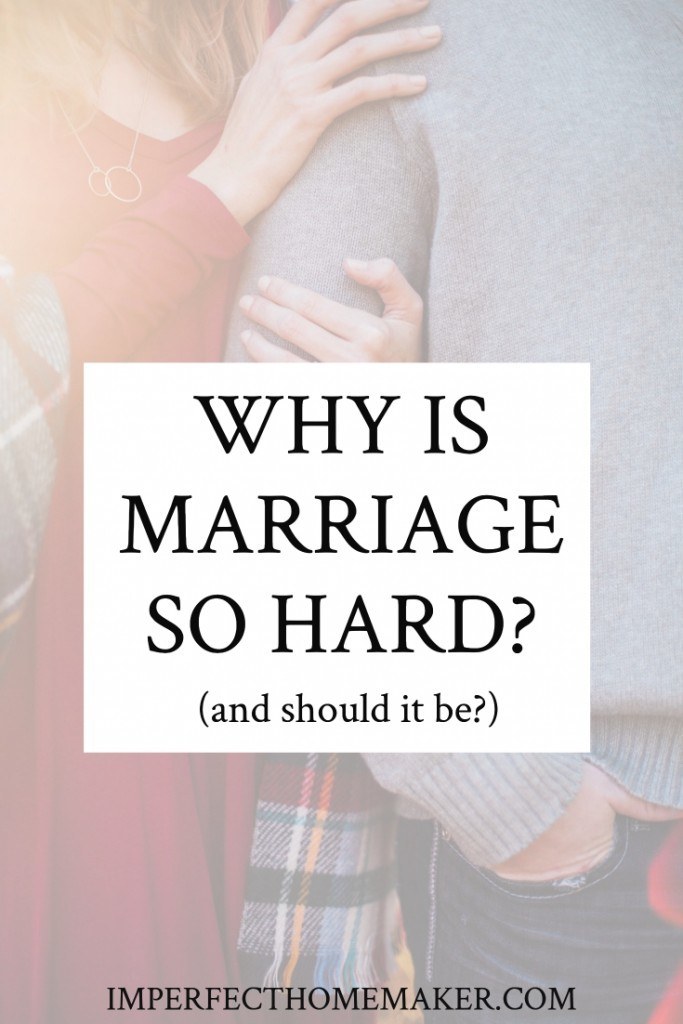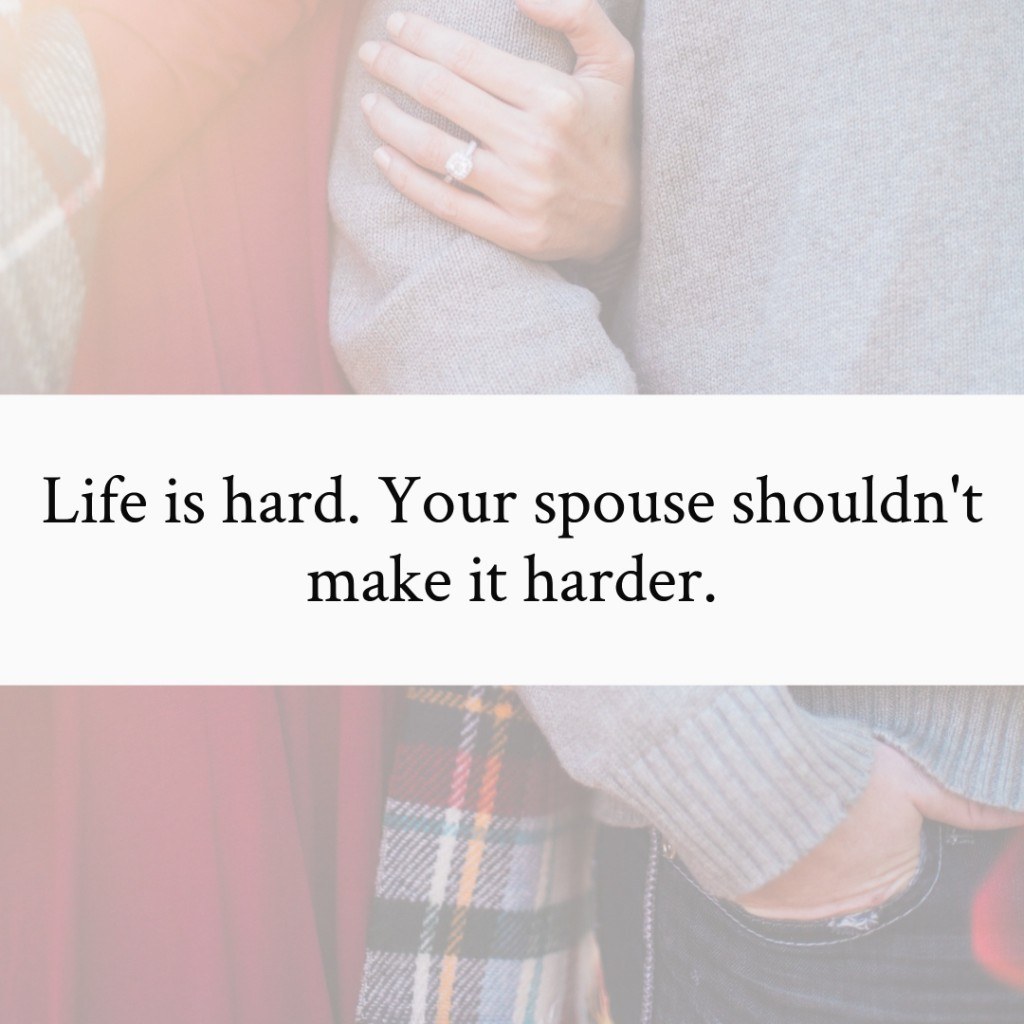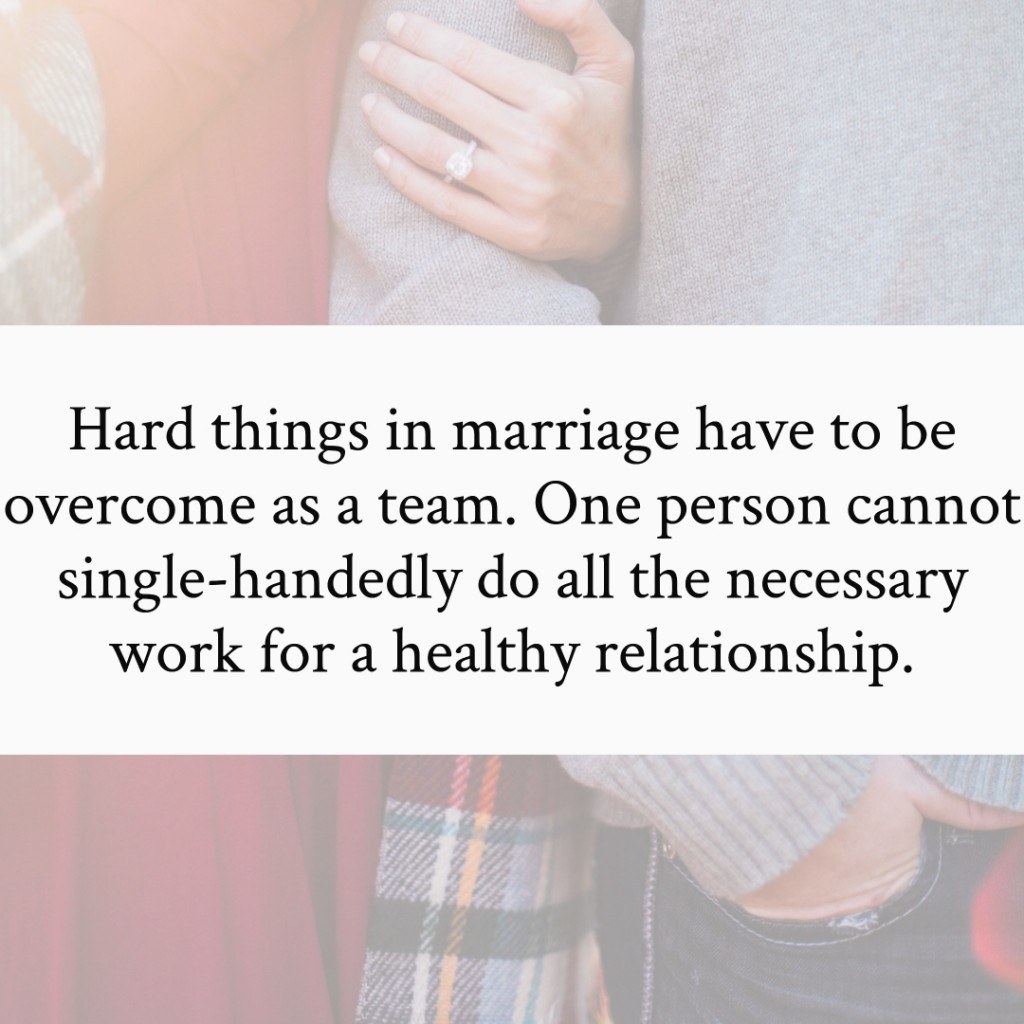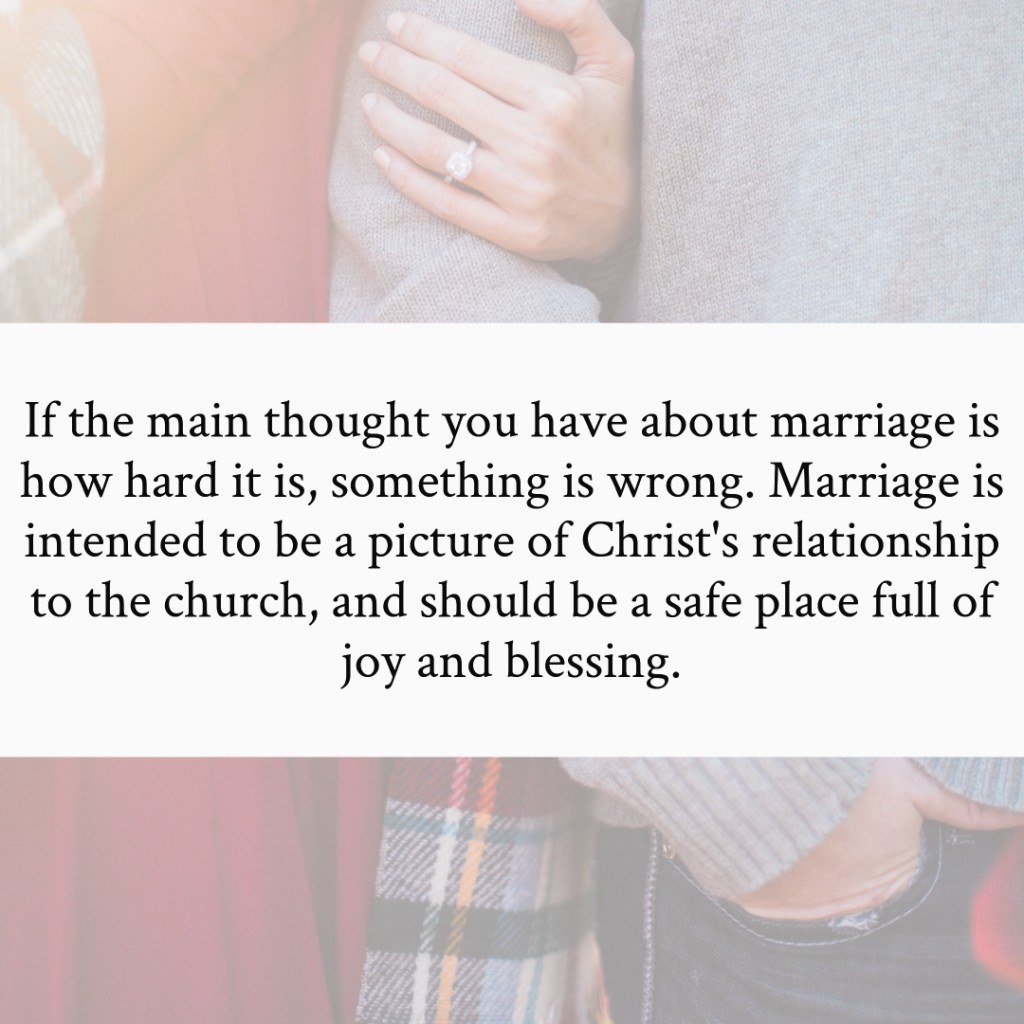Why is Marriage So Hard?
Although I don’t know the intimate details of everyone’s unique circumstances and would never pretend that I know all there is to know about marriage, I would like to address the question, “Why is marriage so hard?”

Why is it important to talk about marriage being hard?
There is a prevailing sentiment that circulates in conversations about marriage, especially in a Christian context, that marriage is hard. For most people it seems to be a given that marriage is hard. I polled my followers on both Facebook and Instagram, and the vast majority said they agreed with the statement that marriage is hard. I think one reason this thinking is particularly prevalent among Christians is that no one wants to be that person who “takes the easy way out.” Most Christians believe that divorce is never an option, so they remind themselves and others that “marriage is hard” (and often add “but so worth it.”)
But the reason we need to talk about this is that the definitions different people have of “hard” can vary widely.
For one person, they may be thinking that it’s hard to hold in critical words when their spouse puts the toilet paper roll on the wrong way. Maybe it bothers them a lot and they have a feisty personality, and they’ve had to work hard to respond to little irritations with grace. For another person, they may be thinking that marriage is hard because life keeps them so busy that it takes a lot of effort to regularly make time to connect with their spouse on a deep level.
These are totally legitimate reasons to feel that marriage is hard, and there definitely is a certain amount of effort required to build up and maintain habits that make for a healthy marriage.
However, there are a great deal of people who are not hearing anything like what I’ve just written when they hear that marriage is hard. Many people are being horribly mistreated and abused by their spouse, and they do not even realize it because they have always heard that marriage is hard.
Consider some of the following:
- “I was constantly walking on eggshells. I bent over backwards and tolerated things that most people would not have to deal with because I thought marriage was supposed to be hard.”
- “I was always told that marriage takes sacrifice. So when my husband was using pornography and verbally abusing me, I kept sacrificing and giving him more and more of myself. I was told that if he cheated on me he would come back to the haven that I’d created for him.”
- “I should have seen the red flags of abuse, but because I had always heard how hard marriage is I thought it was normal. I thought it was all my fault because marriage was supposed to require a lot of sacrifice.”
- “My husband treated me horribly and cheated on me. I spent the whole marriage working hard to sacrifice my own selfishness so we could have a good marriage.”
Do you see why this is so important to discuss? The number of women who tell me that all the books and sermons about marriage they’ve read/heard only made it more difficult to recognize the abuse is astronomical. I believe that most people who write and speak about marriage mean well, and from their perspective they’re not speaking to someone in an abusive situation. But when you’re in the midst of abuse, it’s very confusing (purposely so on the part of the abuser), and the victim does not realize that what she is experiencing is abuse. She only knows that…
“Marriage is hard.”
“You have to sacrifice.”
“Marriage requires lots of forgiveness.”
“You have to set aside how you feel and keep your commitment.”
I don’t want to be a part of contributing to an abuse victim’s further confusion and entrapment, do you?
So, when we make statements about marriage being hard, do you think we could all work together to define exactly what we mean?
In no way am I discounting the particular aspects of marriage that you have truly found hard. I’m not asking you to minimize your own experience or telling you not to say that marriage is hard when you really have found it hard. But, can we be sure to clarify that “life is hard, and navigating those hardships as a team takes work, but it should never be your spouse who is causing your life to be hard”?

Did you know that 1 in 4 women will experience domestic abuse in their lifetime? And did you know that those statistics are the same among churchgoers as among those who do not attend church? Abusers love to infiltrate the church and put on a mask of goodness because church people are so quick to believe the best about others and readily forgive offenses. But this means that the women you associate with in your ladies Bible studies, the ones you chat with in the restroom, and the ones sitting near you in the service may be trapped in an abusive relationship. Rarely do people speak of abuse and teach others how to recognize it. It’s not usually on the radar as something that needs to be said in church; it’s more often perceived as something that occurs “out there” in a bad neighborhood somewhere. So when those godly women in our church who have been targeted by an abuser come to our Bible studies and listen to our conversations, they only know that “Marriage is hard.” They don’t know that “Marriage shouldn’t be hard because your spouse makes it hard.”
So why is marriage so hard? Let’s look at some examples of real, legitimate reasons a person might find marriage hard:
- Some seasons of life are highly stressful for both spouses (loss of job, illness, grief, etc.). It takes extra work to remain gracious when we feel emotionally drained.
- Misunderstandings take place, and it takes work to communicate and find out where things went sideways.
- Life is busy. It takes work and planning to go on dates or spend dedicated time together.
- Some people enter marriage expecting a fairytale life which doesn’t exist. When life isn’t endless romance, but instead includes bills, housework, and waking up to a bedhead spouse, they find themselves resentful of the life they now live, and have to work to process how they feel and come to terms with reality.
- Past trauma can make it difficult to trust your spouse, even if they are a trustworthy person. It takes work for the injured spouse to overcome those emotions, and it takes patience and grace on the part of the other spouse.
- Everyone makes mistakes, and it can be hard to swallow our pride and apologize when we’ve said something unkind or acted selfishly.
- What you thought was a given due to your family background (e.g. the table will always be formally set for family dinner, and we will always use proper manners at the table) may be the opposite of what your spouse thought was a given (this is our safe place to relax; let’s use paper plates and not be so formal with our manners.) It takes work to compromise on situations that aren’t harmful to the other person, but can damage the relationship if we always insist on our own way.
- Marriage can be hard when one spouse is chronically ill and the other has to carry a larger portion of the load.
All of these hard things can be overcome when both spouses are humbly submitted to the Holy Spirit’s working in their lives. They can face the misunderstandings, the stresses of life, and the little annoyances together. But it’s so important that we highlight the fact that the hard things in marriage have to be overcome together as a team. One person cannot single-handedly keep a relationship strong — a relationship takes two.

On the flip side, if any of the following examples are reasons why you feel like your marriage is hard, it is important for you to realize that these are NOT normal or legitimate reasons for your marriage to feel hard:
- Your spouse expects you to keep everything perfect at home but doesn’t do their part to help
- Your spouse tells you that you are being lazy when your work doesn’t meet their criteria
- Your spouse treats you like a child, inspecting and criticizing everything you do
- You are expected to take the blame for your spouse’s bad behavior (“I wouldn’t get so angry if you would just ____.”)
- Your spouse twists every discussion around, confuses you, and makes you feel unsure of reality
- You discover lies and deception on the part of your spouse and feel that you are supposed to just forgive and move on
- Your spouse is addicted to pornography
- Your spouse blames childhood trauma or an alcoholic father for their current bad behavior
- Your spouse requires you to have permission to go places or spend time with friends
- You don’t feel to safe to say what you really think or want
- You have to ask permission for money to buy household necessities. You find it difficult to prepare meals with so little grocery money, yet your spouse always has enough money to buy the things they want.
- You are distressed at the cruel way your spouse treats your children or pets
- You feel pressured to have sex with your spouse any time he wants it or in ways that make you feel uncomfortable
- Your spouse makes mountains out of molehills. For instance, if everything is not 100% spotless at home they will be enraged.
- Your spouse repeatedly hurts your feelings, puts you down, belittles you in public or in private, expresses disapproval about everything you do.
- Your spouse regularly makes decisions that impact you without regard to how you feel about them
- Your spouse accuses you of being selfish or ungrateful when you try to address a problem or express a need
- Your spouse does not want to spend time with you; never wants to hear about your day; is not interested in your life or your feelings
- Your spouse does not protect you when you are vulnerable. You are still expected to keep up with housework even when sick or in pain.
This is destructive behavior on the part of your spouse. If your marriage feels hard because of your spouse’s destructive behavior, scroll to the bottom of this post for some resources that will give good advice for your situation.
For those who do not find marriage hard due to any of the reasons above, let’s talk about ways that we can discuss the reasons why marriage is hard while also being extra clear about what we mean.
Perhaps we could start by using the word “but…” in our conversations.
- Marriage is hard because miscommunication happens sometimes, BUT we resolve it in a healthy way.
- Marriage is hard because there are a lot of real-life responsibilities that have to be taken care of, BUT we work together as a team to get them done.
- Marriage is hard because life throws hard things at you, BUT we support each other through life’s seasons of stress and grief.
- Marriage is hard because it’s difficult to make time to connect with each other, BUT we enjoy being involved in other’s lives and it is worth the extra effort.
- Marriage is hard because it requires me to give up some things I want for the good of my spouse, BUT my spouse does the same for me. We both look for ways to serve each other.
- Marriage is hard because sometimes my spouse unknowingly hurts my feelings, BUT I feel safe to discuss it and know I will never be blamed for being “too sensitive.”
- Marriage is hard because it requires work to develop tools for being an emotionally healthy person, BUT we both take responsibility for doing that for ourselves. I am not required to carry the emotional load of us both.
- Marriage is hard because I have past trauma that makes it hard to trust people, BUT my spouse always tells me the truth and has shown by their actions to be a trustworthy person.
- Marriage is hard because sometimes we do or say unkind things, BUT we apologize to each other and make it right.
- Marriage is hard because sometimes we have strong opinions that are opposite of our spouse’s, BUT we both work at seeing things from the other’s perspective and don’t insist that the other person adopt our viewpoint.
If the main thought you have about marriage is how hard it is, something is wrong. Marriage is intended to be a picture of Christ’s relationship to the church, and should therefore be a safe place, full of joy and blessing.

In the words of some of my friends who are abuse survivors:
- “Two are better than one. If being part of the two actually makes your life harder then what’s the point?”
- “Life throws a lot at you, but marriage should be a team working through things together. If the team itself is hard, the team might not be working.”
- “For better or for worse means no matter what life throws at us, not no matter what you do to me.”
- “Life is hard. Marriage should not make it harder.”
- “Hard is not the same thing as harmful.”
- “Every marriage has circumstances that you will have to work through, but it should never be your spouse who is causing the hardships.”
- “The hard work of marriage should be about becoming who God wants you to be, not about putting up with your spouse’s bad behavior.”
So the answer to the question “Why is marriage so hard?” is that we live in a world that is broken down by sin. We have unrealistic expectations about life, we are sometimes selfish, and we have to deal with many hardships that come along as the result of an imperfect world. But marriage should never be hard because of the destructive behavior of our spouse.
Can we work together to make sure we are very clear in the way we speak of marriage?
So many who heard the conversation about marriage being hard testify that instead of knowing the blessing of a God-honoring partnership, they experienced this:
“My love for God and desire to serve and sacrifice even when it was hard kept me in a destructive marriage for too long.”
“I didn’t recognize the abuse in my marriage because I thought it was normal for things to be that hard.”
“I went into marriage expecting to suffer as a direct result of my spouse. I thought I was supposed to suffer.”
“I was led to believe the abuse was my fault, and that I had the ability and responsibility to change him by loving him more, meeting his needs better, and working even harder around the house.”
“I couldn’t even imagine marriage being something good. I thought it was supposed to be terrible.”
“I was taught that it was wrong to say anything bad about my husband, so when things were hard because of him, I went along with the idea that it was because marriage is hard.”
How do you think we can change the way we speak about the realities of marriage? How do you think we can address the genuinely hard aspects of marriage while making it clear that marriage itself should be a blessing and a joy; not a hardship to endure?
Resources for those who wonder if their experience of hardship in marriage is beyond the range of normal:
(Disclosure: some of the following are affiliate links.)
The Emotionally Destructive Marriage by Leslie Vernick
Is it Me? Making Sense of Your Confusing Marriage by Natalie Hoffman
While you wait for your books to arrive, you can spend some time taking this quiz and watching this webinar.
